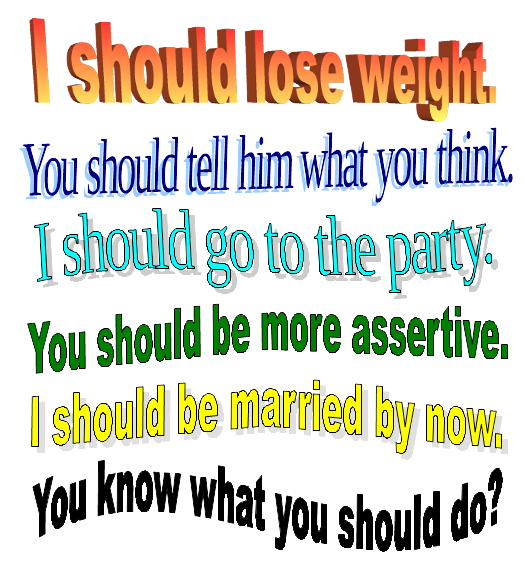Current e-Journal
-

July 21, 2019

Should
We've all experienced what it feels like when we're being told what we should do.
- You know what you should do?
- I / you ought to / must / have to / should...
When someone tells you what you should do, what is your immediate emotional response? Does thinking about all the things you think you should do make you feel excited and energized? Or do you feel overwhelmed, not even knowing where to start?
There are many reasons why should is disempowering. Here are just a few.
- Should creates feelings of blame. If you’re not doing what you should do, that’s your fault.
- Should is a form of advice. And there are so many reasons why giving advice is counterproductive.
- Should suggests that you are smarter and the other person is less so. (Imagine how debilitating that is when you direct those shoulds to yourself!)
- Should makes the choice yours, not theirs.
- Should is arbitrary. "I should? Says who?"
- Should is actually just a story we’re telling ourselves.
Here is the brain mechanics of what happens when we hear the word should: Because should is always reactive, our brains trigger into survival mode, to react to the perceived threat. That creates an ongoing feedback loop that actually creates more and more disempowerment and hopelessness. The behavioral response to that trigger and feedback loop can be anywhere from anger to anxiety, and everything in between.
None of that is going to bring out the best in anyone, whether the person you are shoulding all over is yourself or someone else.
Try This
The following two steps will help you move from disempowering should
1) Practice noticing
Notice how often you say or think should.
… about someone else.
… about yourself.
… about the world / society.
To take this part of the exercise seriously, keep a list. Note every time during the day you think, “You know what he should do?” Or "I should lose some weight." Or, “All those politicians should…”
2) Practice substituting more compassionate, neutral phrases and approaches.
Here are some approaches you can try. Notice what changes when you move away from should and move towards trusting the judgment of the person you are talking to (including yourself).
- Say nothing. Hold the space and use Catalytic Listening to bring out the wisdom of the other person.
- If you must say something (Hint: Usually you don't have to say anything), shift from what "they/you should" statements to "I" statements that take responsibility for your feelings.
Example:
The airlines should treat people better.
vs.
I wish the airlines would treat people better.
Converting "you" and "they" statements into "I" statements that share your own vulnerability and how you are feeling, shifts the conversation from blame to an honest exchange of feelings. This allows you to take responsibility for how you feel, rather than blaming the other person for how you feel
Other examples of "I" statements include...
"I feel scared, worried, hurt, disappointed, betrayed..."
Acknowledging our own inadvertent role in disempowering ourselves and others is a big step towards creating conditions for us all to be at our best. That is why Catalytic Listening is one of the three core practices of the Catalytic Thinking framework.
Resources to Support Your Practice
These resources will help you exercise your listening muscles:
- WATCH: This short 3 minute video – Listening as Leadership - will help you see what listening can look like in action.
- LEARN: This 6 minute video class excerpt will help you understand why you have the should habit in the first place – and what you can do to begin moving to more productive and life-affirming conversations.
Want to learn alongside other people who are also trying out Catalytic Thinking practices? Join our Catalytic Thinking in Action community on Facebook - a welcoming place where you can ask questions and learn from people like you who are experimenting with these practices. We look forward to seeing you there!
Help Keep Our Programs Freely Available
Most of the programs at Creating the Future are free or low cost, with liberal tuition assistance when they aren’t.
If you find our programs of benefit, we hope you will consider contributing, to help keep these programs available to as many people as possible. Donate here ...
eJournal Archives:
If you’re new to our eJournal, or just want to remind yourself of past practice exercises we’ve shared, check out our eJournal archives here.
SUBSCRIBE
to get this e-Journal
Creating the Future is a 501(c)(3) tax exempt organization in the U.S.A

